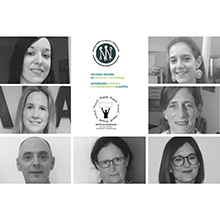2 March 2021

Navarra, Spain – While the media have been in charge of alerting of the serious situation in nursing care homes and hospitals, people with dementia who lived at home as well as their caregivers, have suffered the consequences of mandatory household confinement in silence. The study, led by the “Dementia Group” of “Navarra Society of Geriatrics and Gerontology” in collaboration with Geriatric’s Service of the “Hospital de Navarra” and “Alzheimer’s Family Association in Navarra” (AFAN), has been published in the Journal of Alzheimer’s Disease. A multi-tiered supportive approach that ensures the continuity of a quality care for people with dementia and their caregivers must be developed. New technologies adapted to the current pandemic situation are being developing.
Recent confinement in the context of COVID-19 pandemic has been a challenge for people with dementia (PwD) and their caregivers. The study was motivated because all the attention to the consequences of confinement was focused on the institutional setting and few spoke about what happened to those people with dementia and their caregivers who lived at their homes in the community. The authors designed a survey with the main objective of knowing the needs of the caregivers in order to subsequently offer solutions to the problems detected in this context of care. Caregivers have not only had to increase the time of care due to the closure of day centers and other recreational places; they have also fought against the fear of not being infected to safeguard the health of their family members or the frustration of not having any social support.
A total of 106 caregivers took part of the study, who answered some questions related to their personal profile, the main problems as caregivers during the pandemic and the consequences for both PwD and themselves. “The caregivers in our study reported the negative effect of the restrictions on their family members and the feeling of not having the support of public institutions, transforming their role as caregivers into a great complicated job.” explains Nuria Carcavilla, psychologist and researcher at the Institute of Neurosciences of Castilla and Leon (INCYL) and first author of the study, which is widely defended by Ana Sofía Pozo, third year medical resident of Geriatrics in “Hospital de Navarra”.
The study, published in the Journal of Alzheimer's Disease, has been led by healthcare professionals of the “Dementia Group” from the “Navarra Society of Geriatrics and Gerontology”. The work was carried out in collaboration with Geriatric’s Service of the “Hospital de Navarra” and “Alzheimer’s Family Association in Navarra” (AFAN). Full citation is included in the Notes for Editors section.
Household confinement consequences
PwD experienced functional and/or cognitive impairment and they were much more irritable and their caregivers felt anxious and they developed mood, sleep and/or eating disorders. They missed professional help, especially from specialized medical teams. These results are interesting because we have detected unmet primary health needs and now it’s essential to provide dementia caregivers other help sources, adapting ourselves to new communication technologies that are spreading during the pandemic.

Image: Several of the authors of the manuscript. From left to right: Jose Joaquín Roldan, Victoria Erice, Nuria Carcavilla, Belén González and Ana Sofía Pozo.
###
NOTES FOR EDITORS:
Full openly available study: "Needs of Dementia Family Caregivers in Spain During the COVID-19 pandemic” by Nuria Carcavilla, Ana Sofía Pozo, Belen González, Débora Moral-Cuesta, Jose Joaquín Roldan, Victoria Erice and Ana Remírez de Ganuza (DOI: 10.3233/JAD-201430) published online in the Journal of Alzheimer's Disease, in advance of Volume 80, Issue 2 (March 2021). The article is freely available online at: content.iospress.com/articles/journal-of-alzheimers-disease/jad201430.
Contact
Media contacts to Nuria Carcavilla González for further information (+34 627557140, nuriacarcavilla@usal.es).
About the Journal of Alzheimer's Disease
Now in its 24th year of publication, the Journal of Alzheimer's Disease (JAD) is an international multidisciplinary journal to facilitate progress in understanding the etiology, pathogenesis, epidemiology, genetics, behavior, treatment, and psychology of Alzheimer's disease. The journal publishes research reports, reviews, short communications, book reviews, and letters-to-the-editor. Groundbreaking research that has appeared in the journal includes novel therapeutic targets, mechanisms of disease, and clinical trial outcomes. JAD has a Journal Impact Factor of 3.909 according to Journal Citation Reports (Clarivate, 2020). JAD is published by IOS Press. j-alz.com







